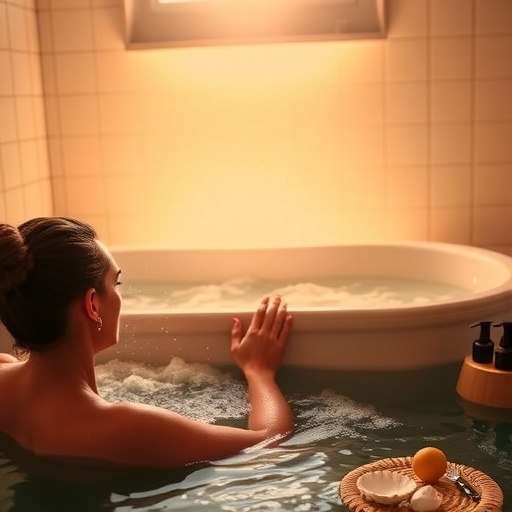In a groundbreaking study published in BMC Complementary Medicine and Therapies, researchers have delved into the therapeutic benefits of warm saltwater and warm water baths for individuals suffering from rheumatoid arthritis. This chronic autoimmune condition significantly impacts patients’ quality of life, leading to persistent pain, debilitating fatigue, disturbed sleep routines, and reduced functional capability. With a growing body of evidence highlighting the benefits of hydrotherapy, this research provides a compelling addition to the ongoing discourse.
The design of the study was meticulously crafted as a randomized controlled trial, one of the most robust methodologies in clinical research aimed at evaluating treatment efficacy. The primary objective was to ascertain how warm saltwater baths and warm water baths correlate with improvements in critical health indicators among rheumatoid arthritis patients. The controlled nature of the study ensured that results were not skewed by external variables, thus reinforcing the validity of the findings.
Participants were selected based on specific inclusion criteria that adhered strictly to the guidelines set for rheumatoid arthritis. This included adults diagnosed with the condition who were experiencing joint pain, stiffness, and other associated symptoms. By focusing on a homogenous group, researchers ensured that the conclusions drawn would be more reliable and could be generalized to a broader population of rheumatoid arthritis sufferers.
As participants engaged in various bathing protocols, both in saltwater and freshwater environments, consistent assessments were made to monitor pain levels, fatigue, and sleep quality. These parameters were quantified using validated scales, allowing for objective measures of changes over the study period. Each participant received a thorough evaluation before, during, and after the bathing interventions to track improvements or any potential side effects.
Pain management is critical for improving the quality of life in rheumatoid arthritis patients, and the research highlighted significant advancements in pain relief for those undergoing warm baths. Warm water has been known for ages to have analgesic properties due to its ability to enhance blood circulation and promote tissue relaxation. Clinical evidence gathered from the study supports the notion that regular exposure to elevated water temperatures could lead to tangible pain relief, thereby improving overall patient satisfaction.
Moreover, fatigue is one of the lesser-discussed yet highly impactful components of rheumatoid arthritis. The study observed that participants who soaked in warm waters reported noticeably lower fatigue levels. The psychological benefits in conjunction with physiological responses would suggest that such bathing routines might not only alleviate physical symptoms but also contribute to enhanced emotional well-being.
Sleep quality, another critical area of concern in chronic pain patients, was similarly assessed. The results indicated that individuals who engaged in warm water baths experienced improvements in their sleep patterns. Sleep disruptions are common in patients with rheumatoid arthritis, and by utilizing hydrotherapy, there stands potential for non-pharmacological interventions to facilitate better rest. This aspect of the study underlines the far-reaching benefits of holistic approaches in medical treatment strategies.
Functional capacity was another vital parameter analyzed during the study. Researchers utilized various functional assessment tools to measure the range of motion, grip strength, and overall physical capability of participants. The findings revealed that consistent bathing in warm water—especially if combined with salt—could markedly enhance functional abilities, enabling patients to engage in daily activities with less discomfort.
As the medical community seeks to diversify treatment modalities for rheumatoid arthritis, this study fills a significant gap by highlighting an underutilized but effective therapy. Traditional treatments often focus on pharmacological solutions that may accompany unwanted side effects. Given the emerging trends in patient-centered care, incorporating hydrotherapy could provide a more comprehensive approach to managing this chronic disease.
The implications of these findings could foster a shift in how healthcare providers recommend holistic management options to patients. While medications remain a cornerstone of treatment, integrating non-invasive methods such as warm water baths could empower patients, promoting self-management practices that lead to better health outcomes.
Despite the promising nature of the findings, researchers advocate for further investigations to reinforce and expand on their conclusions. As this knowledge evolves, it would be prudent to explore the long-term effects of regular hydrotherapy and to identify optimal bathing practices that yield the best results for various patient demographics.
In conclusion, the research conducted offers essential insights into the potential of warm saltwater and warm water baths as viable adjunct therapies in managing rheumatoid arthritis. The positive outcomes regarding pain reduction, fatigue alleviation, sleep quality improvement, and enhanced functional capacity are significant and suggest that hydrotherapy could play a crucial role in modern rheumatological treatments. Broadening the scope of therapeutic options ultimately enriches the quality of care delivered to individuals grappling with difficult autoimmune challenges.
As the scientific community embraces these findings, it would not be surprising to see a gradual integration of hydrotherapy into standardized treatment protocols. The call for comprehensive, patient-oriented care is growing louder, and studies like this underscore the importance of bridging traditional medicine with alternative therapeutic practices. For patients wishfully navigating the challenges of rheumatoid arthritis, the journey towards relief may find a promising ally in the soothing embrace of warm waters.
Subject of Research: The effect of warm saltwater and warm water baths on pain, fatigue, sleep quality, and functional capacity in patients with rheumatoid arthritis.
Article Title: The effect of warm saltwater and warm water baths on pain, fatigue, sleep quality, and functional capacity in patients with rheumatoid arthritis: a randomized controlled study.
Article References:
Aktaş, O., Dönmez, A.A., Kapucu, S. et al. The effect of warm saltwater and warm water baths on pain, fatigue, sleep quality, and functional capacity in patients with rheumatoid arthritis: a randomized controlled study✰.
BMC Complement Med Ther 25, 302 (2025). https://doi.org/10.1186/s12906-025-05050-2
Image Credits: AI Generated
DOI: 10.1186/s12906-025-05050-2
Keywords: Rheumatoid arthritis, warm saltwater baths, warm water baths, pain relief, fatigue, sleep quality, functional capacity, hydrotherapy, randomized controlled study.




